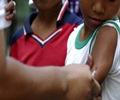Glossary
Diphtheria: A bacterial disease marked by the formation of a false membrane, especially in the throat, which can cause death.
Incubation period: The time from contact with infectious agents (bacteria or viruses) to onset of disease.
Mucosal membranes: The soft, wet tissue that lines body openings specifically the mouth, nose, rectum and vagina.
Croup: Respiratory infection with a characteristic cough.
Fever: Raised body temperature usually with other symptoms.
Myocarditis: Inflammation of the myocardium (muscle walls of the heart)
Acute: A short-term, intense health effect.
Allergy: A condition in which the body has an exaggerated response to a substance (e.g. food or drug).
Antibiotic: A substance that fights bacteria.
Antitoxin: Antibodies capable of destroying microorganisms including viruses and bacteria.
Bacteria: Tiny one-celled organisms present throughout the environment that require a microscope to be seen. While not all bacteria are harmful, some cause disease.
Arrhythmias: Irregularity in the hearts beating rhythm.
Booster shots: Additional doses of a vaccine needed periodically to "boost" the immune system. For example, the tetanus and diphtheria (Td) vaccine, is recommended for adults every ten years.
Epidemic: The occurrence of disease within a specific geographical area or population that is in excess of what is normally expected.
Immunity: Protection against a disease. There are two types of immunity, passive and active. Immunity is indicated by the presence of antibodies in the blood and can usually be determined with a laboratory test.
Infectious: Capable of spreading disease. It is also known as communicable.
Neuritis: Inflammation of the nerves.
Risk: The likelihood that an individual will experience a certain event.
Side Effect: Undesirable reaction resulting from immunization.
Vaccine: A product that produces immunity therefore protecting the body from the disease. Vaccines are administered through needle injections, by mouth and by aerosol.
Culture: A laboratory test that involves the growing of bacteria or other microorganisms to aid in the diagnosis.
Immunocompromised: An abnormal condition where one's ability to fight infection is decreased. This can be due to a disease process, certain medications, or a condition present at birth.
Inflammation: Redness, swelling, heat, and pain in a tissue due to chemical or physical injury, infection, or allergic reaction.
Lymph nodes: Part of the lymphatic system; bean-shaped organs, found in the underarm, groin, neck, and abdomen, that act as filters for the lymph fluid as it passes through them.












